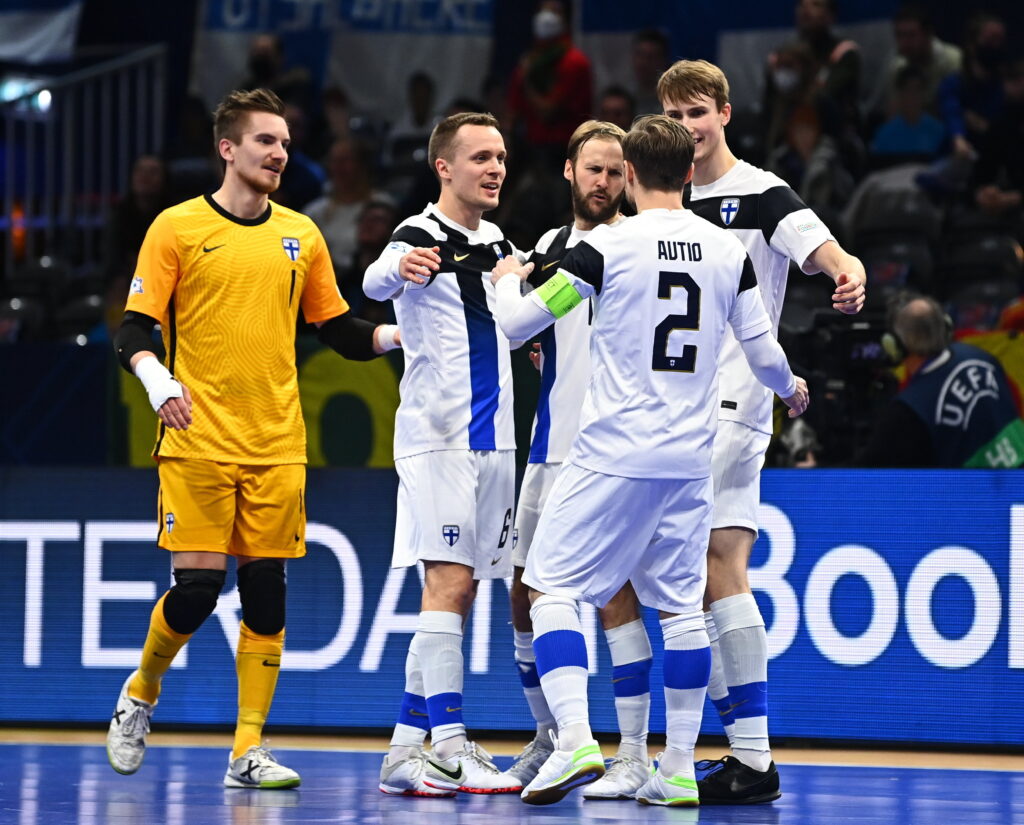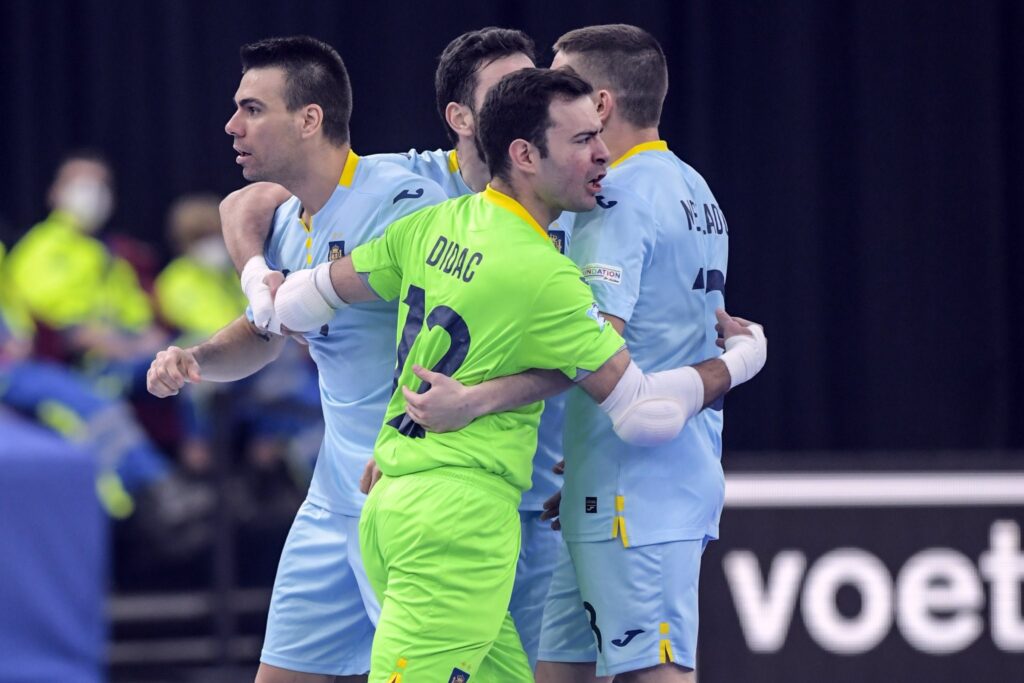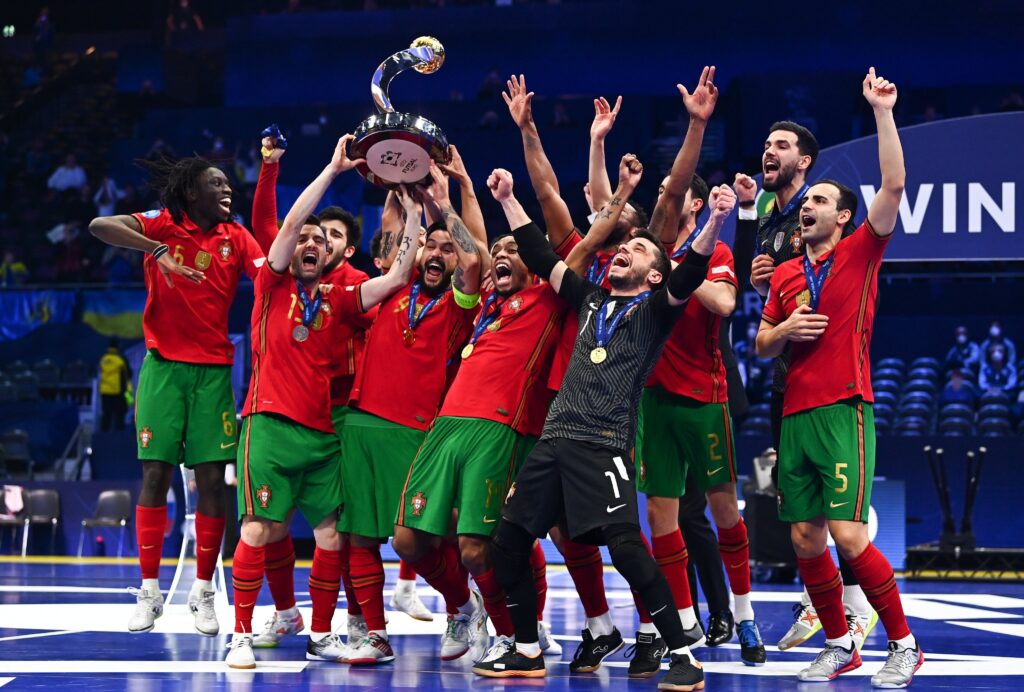The 12th Edition of the UEFA Futsal Euros concluded yesterday with Portugal lifting the trophy once again after defeating Russia in the final.
Here are 10 quick thoughts about the championships.
10. New Tournament Structure
The expansion to 16 teams for the first time allowed the initial phase to increase from groups of three to groups of four. This was a huge improvement as teams didn’t gain an advantage or disadvantage according to when they were resting. Instead of potentially meaningless games on the final group matchday, we enjoyed the tension of the constantly changing tables and qualifying teams as final group matches were played simultaeneously.
9. Debutants Performance
Often expansion in a tournament is associated with walkovers due to the introduction of weaker nations. This was not the case with 3 of the 4 debutants making the knockout stages and only 2 games finishing with more than a 4-goal difference in the entire competition.
This demonstrates how futsal is establishing itself in places beyond the traditional regions. With the mutual benefits from more countries having competitive futsal, I predict the speed of these developments is only going to increase.

8. “The King is Dead, Long Live The King”
Before the championships there was naturally a lot of talk about Ricardinho and how his absence would be felt. The former Portuguese captain’s contribution has left an eternal mark on the Euros and international futsal. His personal Euro goal compilation alone is something to behold.
However, it was no surprise that from start to finish we were not short of amazing talent, skills and goals. Futsal has an innate capacity to produce the spectacular, and whilst we will miss Ricardinho, we can be assured there will always be talent in abundance. Even Portugal themselves have developed another superstar.
7. Restricted Attendances
One absence that certainly was felt was the lack of fans. After the sell-out crowds of recent editions, it was a real shame that the Covid-19 situation prevented this from being repeated in the Netherlands. The wave of noise created by fans in the indoor arenas would have only added to the games. I’m sure the Netherlands would have made it to the knockout stages if they had the boost of home support.
Whilst the Euros will recover and the next tournament will attract the masses once again, it is a shame that the Dutch will not have this opportunity for the foreseeable future. It would be great to see them awarded one of UEFA’s other futsal championships as a small consolation.
6. Referee Video Review
With the World Cup in Lithuania and the Euros in the Netherlands, we have had two major championships within the space of a few months. One where referees could use video replays, and one where they couldn’t*.
When considering rules for the professional game, we mustn’t forget that this is an entertainment product and not only about getting the right decisions (though even with video replay there can still be disagreements).
The flow of the game and instant emotion from a goal are critical elements to captivate an audience. In the World Cup each Head Coach got one challenge per half. Maybe this was the ideal balance between making it entertaining as possible whilst avoiding clear game-changing refereeing errors.
So should we have video replays at all major championships?
*The double yellow card for Croatia’s Matošević against Russia appeared to be an unofficial use of video replay at the Euros.
5. Viewers’ Experience
For this tournament I noticed a significant increase in coverage compared with previous editions. During the Euros both professionals and enthusiasts produced podcasts, articles, magazines and social media posts that were full of interesting insights.
Engaging people in the stories of the event is so important to growing the interest. Just like any story, the audience needs to understand the characters, settings, plots, conflicts/resolutions and themes. Without naming anyone in particular, well done to everyone that contributed to this brilliant storytelling.
Whilst the quality of coverage is important so is the quantity. We need these championships to reach the widest audience possible as UEFA, along with the participants, have built the event into currently the most powerful marketing tool for futsal.
Due to the futsal broadcasting rights often being included in the sales of their football equivalents, this can result in a broadcasters purchasing exclusive rights to show the games but then not using them. I hope we will start to see futsal commercial and broadcasting rights unbundled from their football equivalents (as in the case of the Spanish FA selling futsal kit manufacturer rights independently) so that futsal can become self-sustainable. Whilst these may bring in very small revenues initially, it starts the journey to building the audience which will make them more valuable in the future.
4. Fly Goalkeeper
It was interesting to see nearly all the teams pushing goalkeepers forward to play out of pressing with most returning once their team had progressed to the opponent’s half. However, I am still not convinced that this is currently an effective strategy for the majority with lots of goalkeepers kicking the ball out of play or, on a few occasions, losing possession and conceding a clear goal scoring opportunity.
This strategy requires both a tactical plan that co-ordinates all the players on court and a goalkeeper that, not only has the technical ability with their feet, but also the calmness and awareness to find a solution when under pressure.
This is a key consideration for youth development and talent identification of goalkeepers going forward. The ability of Higuita and a few others have probably influenced this trend and I expect this to become the standard model of goalkeeper in the future.

3. Europe’s Samba Stars
The naturalisation of Brazilian players has reached extremes with 28 in the tournament overall and Georgia making additions that had never even played in the country. Being able to watch the additional talent is a real treat and no-one can fault the players who rightly take the opportunity to play in such prestigious competitions and earn financial rewards.
However, does it deliver success for the country?
It depends on how you define success but in terms of championship performance there have been mixed results. Azerbaijan, Kazakhstan and Georgia have certainly improved. Russia, despite an immense wealth of homegrown talent, has utilised Brazilians for several years but still not matched the feat of the 1999 generation.
Italy’s situation is similar and after using a higher number of Italian players under their previous coach, have gone back to relying on more Brazilians and finished bottom of their group.
Does having imported players affect the satisfaction gained from any results?
If success is long-term futsal development, then it raises even more questions. If it does help you get results, is the promotion from this worth not investing that money in participation, youth development and marketing that would deliver something more sustainable? Is it helping homegrown players develop alongside them or blocking their pathway and aspirations?
Similarly, is it succesful for the sport? Does the positive of additional talent in the competition outweigh the impact on its credibility with it being a national team rather than a club competition? And is a player who has played in the country for a number of years justifiably eligible to represent the country even if none of their youth career was there?
There will always be some element of subjectivity and personal preference in the answers to these questions.
2. Physical Demands
As nearly every sport has experienced over the last two decades, the physical attributes of the competitors has become increasingly important. Futsal is now a very high intensity contest for the entire 40 minutes.
Countries such as Finland and Portugal utilised all the players in their squads and were able to maintain their intensity both through games and the tournament overall. In contrast, the Balkan nations continued their preference for concentrating their game minutes to a limited number of players and it showed with attacks becoming static and avoidable defensive lapses.
1. Portugal’s Golden Era
From polls on social media before the semi-finals Portugal were not fancied by many to go on and win the trophy. Why did so many underestimate the defending European champions and World Cup winners (not forgetting they had 6 from the last UEFA Futsal Champions League winners)?
I recognise I was one of those to make this mistake and like many others my mind was changed after their sublime performance against Spain in the semi-finals. In previous victories against their neighbours, arguments could have been made about Spain being the better team in those games but there were no doubts that Portugal were superior this time.

As well as showing their abundance of individual talent, they now have built that winning mentality where when going behind, 2 goals down in the case of the semi-finals and final, they remain calm due to an unquestioned belief that they are going to win. Their position at the top of European and World futsal is well-deserved.
And with most of their players just reaching their prime or younger, just 20 and 21 in the case of two of their best performers in Zicky Té and Tomás Paçó, we can expect the golden era of Portuguese futsal to continue for some time yet.
I would be very interested to hear the trends and developments that intrigued you from these amazing championships so please add your thoughts in the comments below.
Post a comment